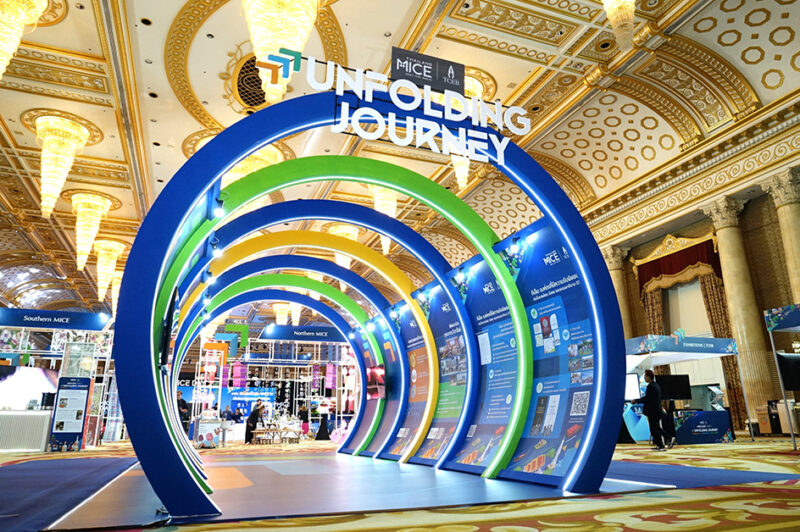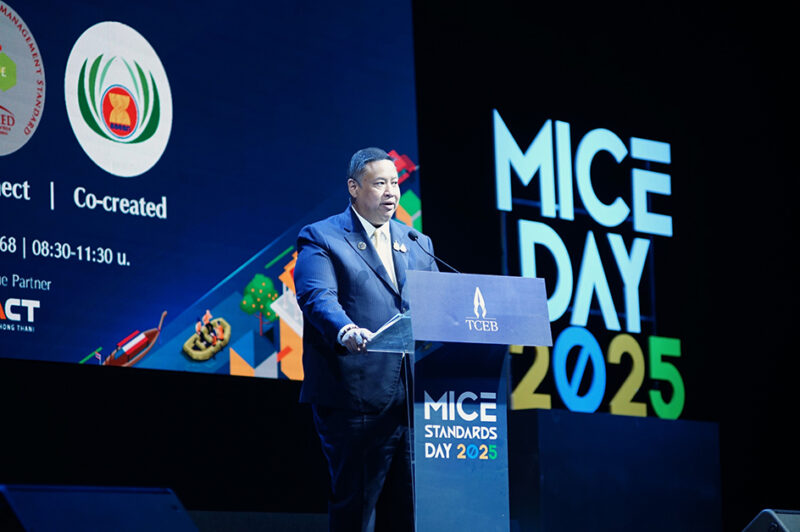
Delta Electronics Tapping on Its Innovations in Power Electronics, Electric Vehicle Charging Technology and Industrial Automation to Support Thailand 4.0; Strong Performance Foreseen in 2017
Delta Electronics (Thailand) Public Company Limited, a leader in power electronics, energy and ICT, remains positive toward full year result in 2017. Revenue grew by 8.3% in the first quarter of 2017 as compared to the same quarter in 2016. In addition, regional push toward Industry 4.0 and the national goal of Thailand 4.0 are expected to drive demand for Delta’s solutions in renewable energy, electric vehicle (EV) charging, industrial automation and datacenter infrastructure. Among many new products slated for 2017, June 2017 will see Delta launching three products, namely, Delta DC Wallbox for EV charging (25kW), E30 Energy Storage System (ESS) and ASDA-MS Robot Controller with DX-2100 3G Router.
Mr. Hsieh Shen-yen, President of Delta Electronics (Thailand) PCL said that Delta has entered the 27th year of its business operations in power electronics, energy and ICT. The company currently has R&D centers in 10 countries, manufacturing plants in four countries and sales offices in 19 countries. In 2016, Delta Thailand and its subsidiaries have collectively achieved 46,887 million Baht in revenue and a net profit of 5,516 million Baht. In 2017, the strong performance in the first quarter was largely driven by solution businesses in India and datacenter related products by global customers.
Over the past 26 years, Delta has undergone three major evolutions. The first was in 2000 where the company started to move beyond transformers and started to design and manufacture computer power supplies. The second evolution was in 2003 with the acquisition of the Swiss company, Ascom Energy Systems. The acquisition and subsequent successful integration of both companies allow Delta to tap into Indian and European markets on top of significantly expanding its product and solution offerings. The third evolution happened in 2014 when Delta started to invest heavily in the regional (India, Southeast Asia and Australia) expansion of its system integration and solution businesses like industrial automation, solar energy and EV charging. In order to better cater to Industry 4.0 and global megatrends, Delta businesses are divided into two main groups- Product and Solution. In 2017, the Product group sees a major reorganization into three new categories namely, Power Electronics, Automation and Infrastructure. Under the Solution group, there are seven solutions namely, Industrial Automation, Building Automation, Datacenter, Telecom Energy, Renewable Energy; and Display and Monitoring.
Delta will continue to roll out more automation solutions in its production facilities to attain Industry 4.0 level using its very own technology. The company’s key customers are located in Europe and USA, while the system and solution businesses are focused in India, Southeast Asia and India regions. Delta sees the biggest potential in the Indian market due to the country’s growing demand for electronics in response to the government’s “Make in India” initiative as well as its ambitious drive for alternative energy and electric vehicles (EV). Mr. Hsieh Shen-yen, President of Delta Electronics (Thailand) PCL., further adds that Delta is investing in a new R&D center in Bangalore, India and a new 316 rai production plant in Tamil Nadu, India. The new plant is expected to be completed by 2018. Delta is also merging Eltek’s Slovakia operation into Delta’s Slovakia plant.
In research and development, the company will continue to invest heavily above industrial average at 4-5% of its sales revenue. Delta strongly believes that continuous innovations are paramount to a sustainable business. For the coming years, apart from power electronics, emphasis will also be placed on systems and solutions development for industrial automation, robots, alternative energy and datacenter infrastructure to better cater to regional markets.
Mr. K. K. Chong, Head of Strategic Marketing, said that the company has double its marketing budget in 2017. This is in response to the strong growth foreseeable for its businesses in India, Southeast Asia and Australia. Apart from India, Thailand’s push for Thailand 4.0 will certainly drive demand in many Delta solutions that are already highly relevant to global megatrends. For the marketing and promotion plan in 2017, Delta has significantly increased its number of regional tradeshows and public relation activities to further strengthen its brand value and recognition. Frequency of media events like seminars and press conferences will increase and regular print advertisements featuring the company and its relevant products will be published monthly on major magazines for the rest of the year. Many collaborations with the public and private sectors to share and promote Delta’s innovations are also in the plan. For example, the opening of the center for learning on electric vehicle technology sees Delta sponsoring its state-of-art Delta EV charging station and sharing the technical know-how with the center.
Mr. Kittisak Ngoenngokngam, Director of Business Development for Southeast Asia, said that Delta is the first company from ASEAN to supply EV charging station and solution. In terms of EV charging technology, Delta is considered as one of the industry leaders with customers from leading international car brands over the past ten years. Delta’s EV charging expertise lies in EV charger and the recharging of electric vehicles. EV charger products comprises of two categories: 1. Off-board type that is located outside the vehicle with various designs such as cord-set EV charger by plug-in method for a full charge in 10 hours, wall mounted charger for a full charge in six hours and DC fast charger for only 15-20 minutes to a full charge; 2. On-board type that is attached to the vehicles such as onboard charger, DC/DC, battery junction box, etc.
The new Delta DC Wallbox (25 kW) EV charging station will be launched in June 2017. The product is designed for various locations including pump stations, office buildings and condominiums and takes just 30-40 minutes to fully charge a vehicle. Delta’s EV charger is already well known in the global market. For example, 300 charging stations in Norway had ordered more than 1,000 units of Delta EV chargers. This is considered Europe’s largest electric vehicle charging station network. Another new product launched by Mr. Kittisak’s team is Delta E30 Energy Storage System (ESS). The innovative Solar Energy Storage System comprises of three systems- the battery, the battery management system and the power conversion system. The ESS can be installed in areas where energy is needed even during the absence of sunlight, such as office buildings and manufacturing plants. A similar product for home use is the E5 model. The technology is in line with more industrial and residential buildings turning to higher usage and dependence of renewable energy.
Mr. Sakda Sae-Ueng, Senior Manager for MCIS, said that in the digital era when Thailand is also moving toward its ambition of Thailand 4.0, Delta’s highly efficient datacenter infrastructure solution that contributes to a highly secured and reliable datacenter is essential for SME and large corporations to compete effectively and efficiently without the risk of compromising the company’s data. Delta InfraSuite Datacenter is a datacenter infrastructure solution that integrates four main modules- Power Management System, Racks & Accessories, Precision Cooling and Environmental Management System. Delta’s datacenter infrastructure solutions are designed to help organizations get the most out of their datacenters with highly efficient and advanced tools to organize the various servers within the organization, maximize the organization’s performance by saving energy and cost while maintaining the flexibility to customize or upgrade for future data demand changes. Delta has designed a set of solutions specifically for Thailand and CLMV region, where Thailand is also known as the gateway to ICT in Indochina.
Mr. Kasemson Kreuatorn, Senior Regional Manager for Industrial Automation, said that Delta Industrial Automation Solution plays an important role in Industry 4.0. This is because of Delta’s ability to design a seamless integration of its hardware and software to provide world class industrial automation solution. Delta’s cloud automation software and IoT capabilities can fully integrate machines, robots, production and factory equipment into an interoperable solution. Consequently, productivity is significantly increased while quality and performance can be customized to suit different customer and market demands. The team is launching the new ASDA-MS Robot Controller in June 2017. The first of its kind product in Thailand controls and commands various types of industrial robots including SCADA robot while meeting stringent European standards. Another new product launched in the same period is the DX-2100 3G Router. The product enables wireless communication via telephone signal between people and machines. Control and monitoring of the machines are linked through the cloud thus unlimited by location and distance between the person and machine.
Mr. Yongyuth Pakdoungjan, Director of Administration and Human Resources, said that in Delta’s relentless pursuit for sustainable development across the company, Corporate Social Responsibility (CSR) and Sustainable Development (SD) activities form a key part of the operation. The company is the first in Thailand to receive the ISO 14064-1 certification on greenhouse gas reduction and has recently won Thailand’s Top Corporate Brand in Electronics Sector 2016.
Some key Delta CSR activities in recent years are the creation of Delta Automation Academy which offers industrial automation courses for undergraduates; the setting up of Delta Industrial Automation Lab in three leading universities (King Mongkut’s University of Technology North Bangkok, King Mongkut’s University of Technology Thonburi and King Mongkut’s Institute of Technology Ladkrabang) with Delta sponsored equipment; the organization of the Delta Cup whereby Thai undergraduates are invited to submit innovative automation projects for a chance to participate in the international competition held annually in Wujiang, China. This year, five teams from five universities were selected for the international competition in July 2017. Another key CSR activity is the setup of Delta angel fund for startups which Delta has collaborated with the Ministry of Industry to sponsor promising startups with financial assistance and business advices based on comprehensive business plans submitted for review by the panels.






